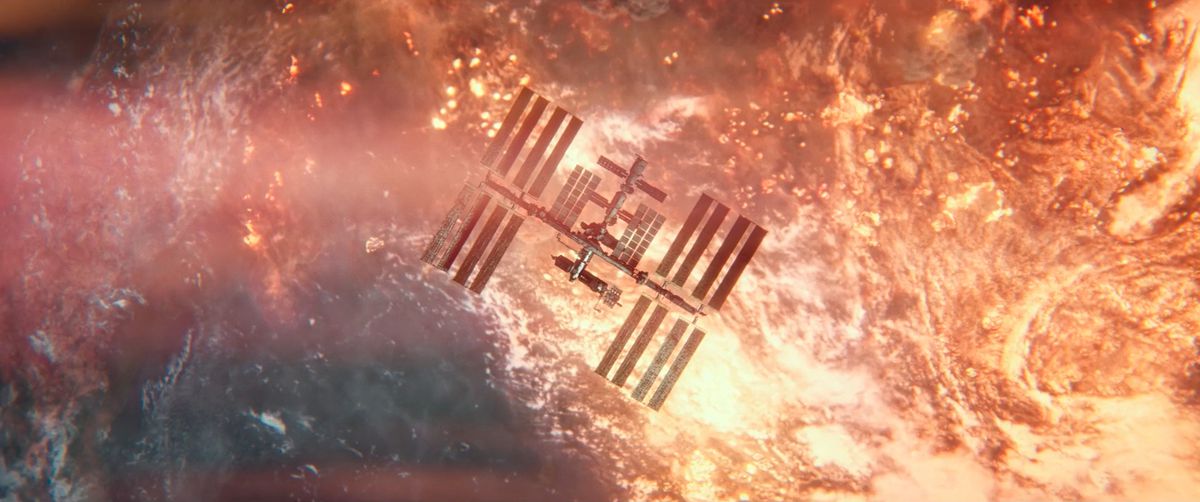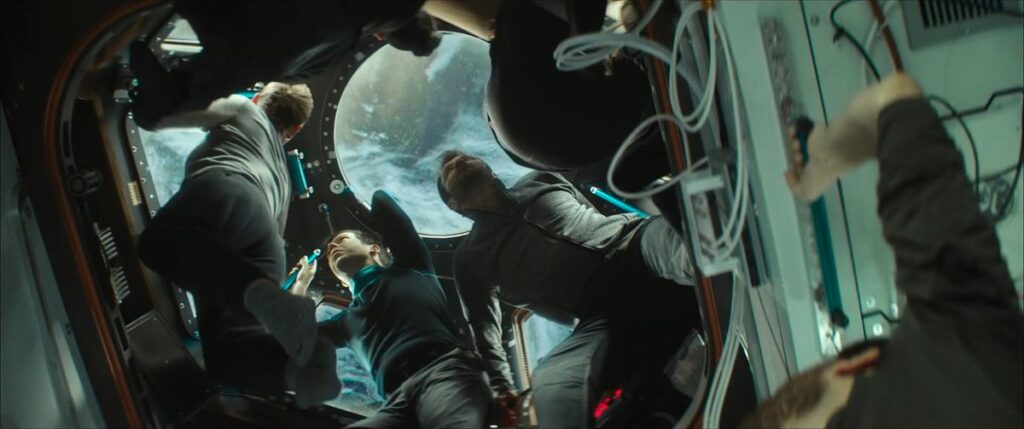It’s only been a little over 10 years since Alfonso Cuarón’s space-disaster survival adventure Gravity made a huge, Oscar-winning splash with a story that takes place almost entirely in a zero-gravity setting, leaving Sandra Bullock and George Clooney bobbing around like balloons throughout most of the action. At the time, the visuals seemed shocking and attention-grabbing, enough to spark an extensive wave of “How did they do that?” technical pieces focusing solely on the zero-gravity effects.
It’s a mark of how far special effects have come in the past decade that similar effects can now be used in a movie as small and pedestrian as I.S.S., another space-set thriller centering on the International Space Station and dealing with some similar survival issues, along with some new ones. The movie is openly designed to be the next Gravity, or at least the next version of Netflix’s sci-fi downer Stowaway. Anchored by recent Oscar-winner Ariana DeBose (Anita in Steven Spielberg’s West Side Story remake, and star of Disney’s Wish) and full of lurking danger and lethal combat, I.S.S. seems at every turn like a movie designed to keep viewers on the edge of their seats, guessing at the characters’ motives and wondering, once the conflict starts, who might die next.
And yet the movie is a tepid botch on pretty much every level. DeBose stars as Dr. Kira Foster, a biologist joining the crew on the International Space Station to work on experiments in artificial organ growth, for personal reasons eventually laid out in a brief, flat monologue. When she arrives, she finds she’s sharing the station with three Russian cosmonauts and two other Americans, all collegiate, cheery types who’ve long since figured out how to smooth the rough edges off their relationships with easy jokes and strong boundaries. They’re sharing a closed, limited environment where privacy is mostly notional, and it’s important to get along. The primary rule they live by: No talking about politics. What happens on the planet stays on the planet.
That rule gets strained to the breaking point when vivid orange mushroom clouds start appearing on the big blue marble that serves as their constant backdrop. Both the Russians and the Americans get secret messages from their respective leadership that say, in effect, “We’re at war. The ISS is strategically important, so secure it for our side by any means necessary.” Which first raises the question of whether these scientists and co-workers are capable of murdering each other, and then the question of whether they can trust each other enough to make peace once the body count rises past zero.
That premise should be a recipe for huge tension and a terrific cat-and-mouse game, a “Who do you trust?” game of dueling motives in an arena claustrophobic and potentially lethal enough to up the ante considerably. But screenwriter Nick Shafir and director Gabriela Cowperthwaite (Blackfish, The Grab) never find any spark or snap in the material. The pacing is frigid and plodding, in spite of the movie’s tight 95-minute run time. Scenes that should be breathless stretch out until they’re baggy. Scenes that are supposed to have room to breathe instead wander without a sense of focus or purpose.
Image: Bleecker Street
None of the characters particularly stand out until the finale, apart from For All Mankind’s Masha Mashkova as a cosmonaut seemingly trying to make up for the rest of the cast’s sleepiness by injecting as much energy as possible into her role. Chris Messina as the ISS captain is distinguishable more by his mustache than by anything his character says or does. Game of Thrones’ ever-reliable Pilou Asbæk, as the most soulful of the cosmonauts, gives his role a kind of weary-bear gravitas. But his character is often reduced to glum lurking or saying other characters’ names meaningfully. He’s given criminally little to work with.
And the heavy-handed symbolism clunking through practically every scene makes the whole film an exercise in waiting to see how long it’ll be before something else allegorical happens. When Dr. Kira unloads her cargo of live mice for her space experiments, they turn on each other in the tension of their new environment and mutilate each other, illustrating how their human counterparts are likely to behave when things get tense. Looking at Earth through the glass cupola of the ISS sparks a meaningful, destined-to-be-ironic conversation about how country borders aren’t visible from orbit, which suggests that space-dwellers shouldn’t concern themselves with nationalism, hint hint.
Even a chance needle-drop of Scorpions’ Cold War-evoking song “Winds of Change” prompts a brief face-off about national tensions and personal history. Every moment is a teaching moment in I.S.S., whether it’s meant to teach the characters, the audience, or both.

Image: Bleecker Street
But the movie has all the energy of a dry classroom lecture. The performances are dialed back almost to monotone level, the score does nothing to goose up the tension, and even the inevitable chase sequence seems slow and distracted. No one here is selling the idea that life or death is on the line. Even Stowaway, the 2021 Anna Kendrick-led sci-fi thriller that similarly delivers its questions about how to choose sacrificial victims in a hushed, respectful whisper, had more energy than this.
All of which leaves viewers with very little to watch for most of I.S.S.’s run time except that vision of the characters floating in freefall, spinning each other around in midair for fun, or trying to navigate crowded doorways by casually yanking each other through. The zero-grav effects in I.S.S. are simple, convincing, and effective, neither used to any great effect nor standing out in distracting ways. They’re serviceable, like everything else about this dialed-down attempt at a thriller. It’s odd to think about how these kinds of special effects become so rote and unremarkable so quickly. The movie’s attempts at conflict and intrigue feel just as unremarkable.
I.S.S. opens in theaters on Jan. 19. Check the movie’s website for local listings.

